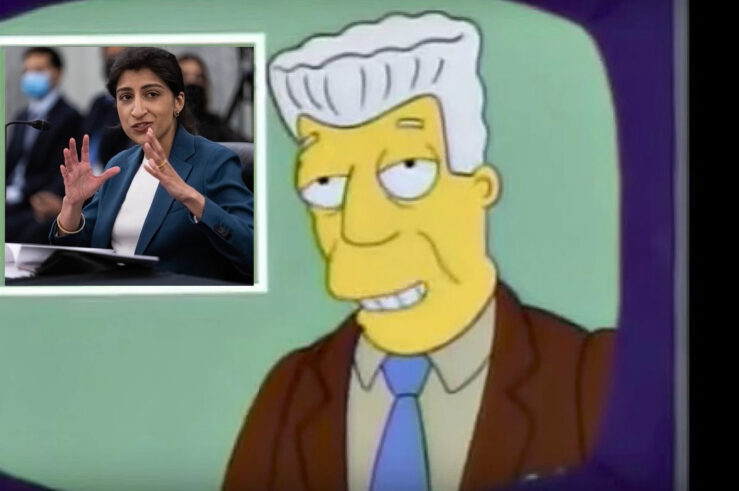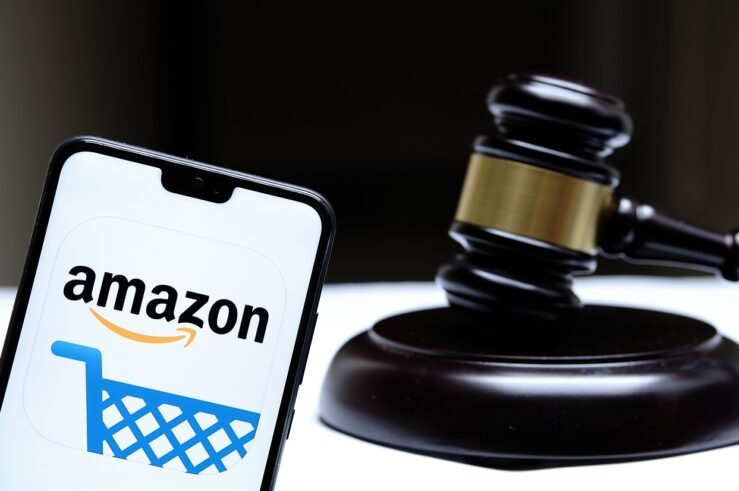Showing archive for: “US Constitution”
I, For One, Welcome Our New FTC Overlords
In this post—the last planned post for this symposium on The FTC’s New Normal (though we will continue to accept unsolicited submissions of responses)—I will offer some summary of the ideas that have been shared here over the past month, before turning to some of my own thoughts. To keep your attention rapt, I will ... I, For One, Welcome Our New FTC Overlords
What Does NetChoice v. Bonta Mean for KOSA and Other Attempts to Protect Children Online?
With yet another win for NetChoice in the U.S. District Court for the Northern District of California—this time a preliminary injunction granted against California’s Age Appropriate Design Code (AADC)—it is worth asking what this means for the federally proposed Kids Online Safety Act (KOSA) and other laws of similar import that have been considered in ... What Does NetChoice v. Bonta Mean for KOSA and Other Attempts to Protect Children Online?
FTC’s Amazon Complaint: Perhaps the Greatest Affront to Consumer and Producer Welfare in Antitrust History
“Seldom in the history of U.S. antitrust law has one case had the potential to do so much good [HARM] for so many people.” – Federal Trade Commission (FTC) Bureau of Competition Deputy Director John Newman, quoted in a Sept. 26 press release announcing the FTC’s lawsuit against Amazon (correction IN ALL CAPS is mine) ... FTC’s Amazon Complaint: Perhaps the Greatest Affront to Consumer and Producer Welfare in Antitrust History
The Marketplace of Ideas: Government Failure Is Worse Than Market Failure When It Comes to Social-Media Misinformation
Today marks the release of a white paper I have been working on for a long time, titled “Knowledge and Decisions in the Information Age: The Law & Economics of Regulating Misinformation on Social-Media Platforms.” In it, I attempt to outline an Austrian law & economics theory of state action under the First Amendment, and ... The Marketplace of Ideas: Government Failure Is Worse Than Market Failure When It Comes to Social-Media Misinformation
Regulatory Humility or Regulatory Hubris at the Federal Trade Commission?
Competition policy at the Federal Trade Commission (FTC) will naturally ebb and flow, depending on its leadership. Over the years, some commissions have taken a more aggressive approach, while others have granted greater credibility to market forces. Still, regardless of the party in power, the agency was generally able to maintain a solid reputation as ... Regulatory Humility or Regulatory Hubris at the Federal Trade Commission?
The FTC Tacks Into the Gale, Battening No Hatches: Part 1
The Evolution of FTC Antitrust Enforcement – Highlights of Its Origins and Major Trends 1910-1914 – Creation and Launch The election of 1912, which led to the creation of the Federal Trade Commission (FTC), occurred at the apex of the Progressive Era. Since antebellum times, Grover Cleveland had been the only Democrat elected as president. ... The FTC Tacks Into the Gale, Battening No Hatches: Part 1
Right to Anonymous Speech, Part 3: Anonymous Speech and Age-Verification Laws
An issue that came up during a terrific panel that I participated in last Thursday—organized by the Federalist Society’s Regulatory Transparency Project—was whether age-verification laws for social-media use infringed on a First Amendment right of either adults or minors to receive speech anonymously. My co-panelist Clare Morell of the Ethics and Public Policy Center put ... Right to Anonymous Speech, Part 3: Anonymous Speech and Age-Verification Laws
Minor Matters in Cyberspace: Examining Internet Age-Verification Regulations
I participated yesterday in a webinar panel hosted by the Federalist Society’s Regulatory Transparency Project. The video was livestreamed at YouTube. Below, I offer my opening remarks, with some links. Thank you for having me. As mentioned, I’m a senior scholar in innovation policy at the International Center for Law & Economics (ICLE). This means ... Minor Matters in Cyberspace: Examining Internet Age-Verification Regulations
Right to Anonymous Speech, Part 2: A Law & Economics Approach
We at the International Center for Law & Economics (ICLE) have written extensively on the intersection of the First Amendment, the regulation of online platforms, and the immunity from liability for user-generated content granted to platforms under Section 230 of the Communications Decency Act of 1996. One of the proposals we put forward was that ... Right to Anonymous Speech, Part 2: A Law & Economics Approach
Right to Anonymous Speech, Part 1: An Introduction from First Principles
What is anonymity? Do we have a right to it? And against what other values should this right be balanced when it comes to government regulation? This blog post will be the first in a series that looks at what anonymity is, why it is important, and what tradeoffs should be considered when applying a ... Right to Anonymous Speech, Part 1: An Introduction from First Principles
Twitter v. Taamneh: Intermediary Liability, The First Amendment, and Section 230
After the oral arguments in Twitter v. Taamneh, Geoffrey Manne, Kristian Stout, and I spilled a lot of ink thinking through the law & economics of intermediary liability and how to draw lines when it comes to social-media companies’ responsibility to prevent online harms stemming from illegal conduct on their platforms. With the Supreme Court’s recent decision in Twitter v. Taamneh, ... Twitter v. Taamneh: Intermediary Liability, The First Amendment, and Section 230
The Law & Economics of Children’s Online Safety: The First Amendment and Online Intermediary Liability
Legislation to secure children’s safety online is all the rage right now, not only on Capitol Hill, but in state legislatures across the country. One of the favored approaches is to impose on platforms a duty of care to protect teen users. For example, Sens. Richard Blumenthal (D-Conn.) and Marsha Blackburn (R-Tenn.) have reintroduced the Kid’s ... The Law & Economics of Children’s Online Safety: The First Amendment and Online Intermediary Liability















